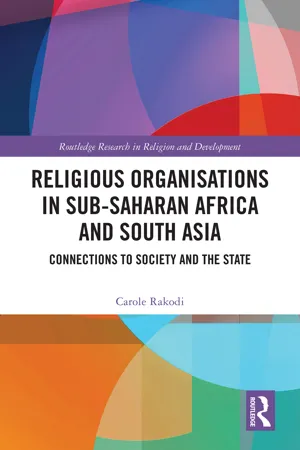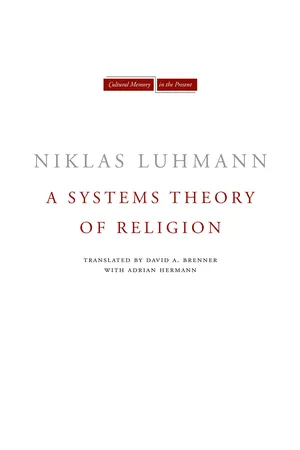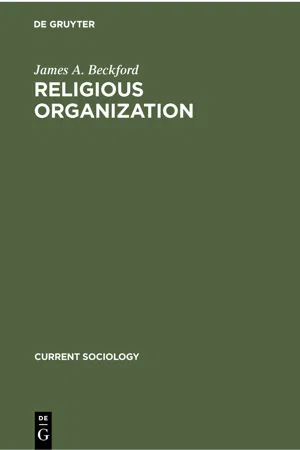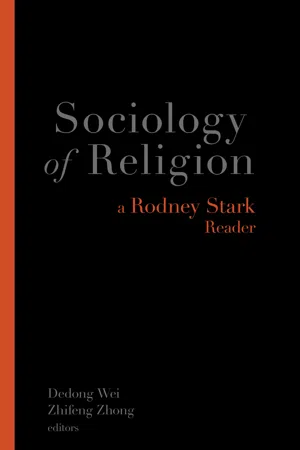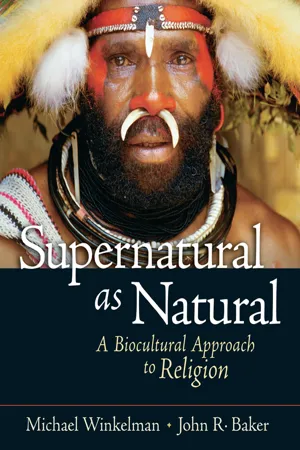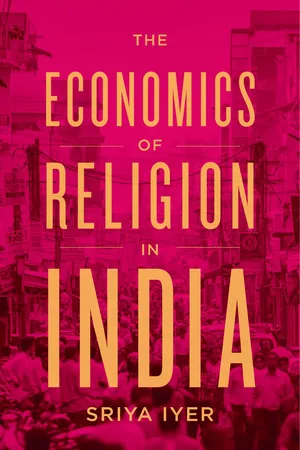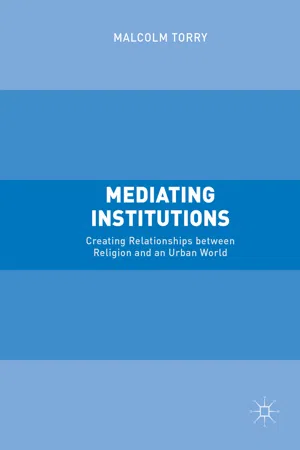Social Sciences
Religious Organisation
A religious organization is a group or institution that is dedicated to the practice, study, and promotion of a particular religion or belief system. These organizations often have a hierarchical structure, with leaders, clergy, and members who participate in religious rituals, services, and community activities. They may also be involved in charitable work, education, and outreach to spread their religious teachings.
Written by Perlego with AI-assistance
Related key terms
1 of 5
7 Key excerpts on "Religious Organisation"
- eBook - ePub
Religious Organisations in Sub-Saharan Africa and South Asia
Connections to Society and the State
- Carole Rakodi(Author)
- 2024(Publication Date)
- Routledge(Publisher)
The aim is not to produce a single overarching theory. Rather, each of the elements of the framework, it is suggested, can be seen as an axis along which differentiation occurs, producing a matrix within which empirical analyses can be located to identify the elements that are key to understanding the interactions between religions and societies. This incorporates religion not only as a source of institutions (rules and norms) that underpin social relationships, but also as a social field that has personal, social and organisational dimensions organised at different levels, including the household; ‘congregation’ or ‘community’; regional and national levels of social, economic and political systems (including national or intermediate Religious Organisational levels such as churches, sects and denominations); and transnational dimensions. It is in this multilevel context that religious and other sociopolitical organisations interact with each other. To understand these interactions, four domains of religion need to be explored: discourses and beliefs, practices, the characteristics of religious groups and their organisational arrangements (Beckford, 1984, 2015 ; Hinings and Raynard, 2014 ; Lincoln, 2006, 2014). Religious Organisations are conceived as including NGO-like organisations, religious hierarchies and bureaucracies, congregations and other religious actors. Both their internal organisation and their relations with states, governments and wider social groups are important in understanding their characteristics and social roles, the processes by which they become institutionalised and bureaucratised, their structures of authority and decision-making, including patterns and practices of leadership, the sources and scale of resources they can mobilise and the regulatory mechanisms to which they are subject or which they impose on adherents - eBook - ePub
- Niklas Luhmann, André Kieserling, David Brenner, Adrian Hermann(Authors)
- 2013(Publication Date)
- Stanford University Press(Publisher)
6 Religious Organizations I In all function systems of modern society, organized social systems play an important, indispensable role. It would be surprising if this were different in the case of religion. Yet it is difficult to imagine that organized decision processes operate in the form of religious actions, that decisions constraining an organization are made in the form of a common prayer or are merely accompanied by a request for divine inspiration. Archives are not sacred objects even in church administrations, and majority decisions have to be made and implemented even when individual participants believe those decisions deviate from God’s declared will. 1 The Old European tradition, the implications of which reach far into modernity, did not distinguish clearly between society and organization. The organizational conception of the present did not even emerge as something separate from the general semantics of order and organism until the nineteenth century. 2 Society itself was understood (in very different conceptual variants) as a natural order of human living together, the result of a social contract motivated by nature. That tradition can be summed up in a term such as “corporation.” In the process, it also becomes clear that this terminology distinguishes what it signifies from families or family households. People are born naturally into these, and they define everyone’s place in the differentiated order of society. Organization mediates between the production of religious meaning, resulting in myths or dogmas, and the daily practice of specifically religious behavior. It thereby takes the place (even when organizing sects) that sects had occupied in the ancient world—whether ancestors in families were being worshipped or rituals were being institutionalized socially - eBook - PDF
Religious Organization
A Trend Report and Bibliography
- James A. Beckford(Author)
- 2020(Publication Date)
- De Gruyter Mouton(Publisher)
There have, however, been attemps to under-stand the organization of both irreligious and non-Christian groups as well as of agencies attached to religious movements. But in comparison with the volume of publications on basically other-than-organizational aspects of Christianity, the amount of attention devoted to the study of organization is still rather small. In addition to the reasons given for this situation in section 3 there are factors in the present socio-cultural context that help to explain it. The processes of secularization and interiorization in Christianity may well have undermined the importance of organization in religion, but what is more certain is that the belief of sociologists that secularization and interiorization were taking place has diverted their attention from matters of organization. This has led to a curious contradiction between the increasing potential of sociology to explain organizational phenomena and the increasing un-willingness of sociologists to realize the potential. The contradiction is matched in its oddity by a growing disparity between the contemporary for-malization of many religious structures and the orientation of sociological theory towards anti-structural modes of thought. Contrary to expectations, the proliferation in recent years of religious research institutes, professional journals for sociologists of religion and sophisticated information-collection schemes have not yet yielded significant advances in accounts of religious organizations qua organizations. They have undoubtedly facilitated the amassing of statistics which may have some value for religious administrators, but in the absence of theoretical relevance these data can hardly contribute towards the improvement of sociological knowledge. Theoretical relevance is in the long term crucial for sociological research, since it is a pre-requisite for comparative and replicative studies. - eBook - PDF
Sociology of Religion
A Rodney Stark Reader
- Rodney Stark, Dedong Wei, Zhifeng Zhong(Authors)
- 2015(Publication Date)
- Baylor University Press(Publisher)
It is indicative of the importance placed on religion that it serves as the basis for what was perhaps the second specialization to emerge (Spencer [1876] 1896, vol. 2; Lenski 1966). Not surprisingly, societies lacking religious specialists also are relatively deficient in terms of their religious culture (Holmberg 1950; Nor-beck 1961). Among the Chenchu nomads in the jungles of the Indian state of Andhra Pradesh, there “are no priests or other religious experts . . . and the structure of Chenchu religions is thus one of extreme simplicity” (Parrinder 1983: 37). As with the fine arts, so too with religion: creative talent is uncom-mon and it benefits from training and practice. Definition 11: An ecclesiastic is anyone who specializes in religion—in explaining, supervising, and/or conducting exchanges with a God or Gods. / SOCIOLOGY OF RELIGION 80 I have followed Herbert Spencer ([1876] 1896, vol. 2) in using this term to identify religious specialists. Its advantages are several. It does not impute gender and seems sufficiently generic to transcend cross-cultural variations in a way that terms such as “priest” or “clergy” do not. Definition 12: Religious organizations are social enterprises whose primary purpose is to create, maintain, and supply religion to some set of individuals and to support and supervise their exchanges with a God or Gods. People may participate in religious organizations for all sorts of secular reasons (fun and friendship are common motives), but the raison d’être of all organizations to be identified as religious has to do with relationships with a God or Gods. 18. A religious organization will be able to require extended and exclusive commitments to the extent that it offers oth-erworldly rewards. This is a simple extension of propositions 13–15. As a direct result of the capacities attributed to the God or Gods they serve, religious organizations will differ in the extent they can bind members into a long-term and exclu-sive relationship. - eBook - ePub
Supernatural as Natural
A Biocultural Approach to Religion
- Michael Winkelman, John R. Baker(Authors)
- 2015(Publication Date)
- Routledge(Publisher)
Religion projects a cosmic order that serves as a general model of the Universe, and then socializes human beings to help to ensure that people’s morals, emotions, and judgments conform to these ideals. Symbol System. Religion expands the functions of symbols beyond their ordinary capacities. Symbols normally refer to things that we can see and touch, but in the context of religion, symbols are used to refer to things that we may never see or touch and even to things that we may be unable to experience or conceptualize. The symbols of religion not only depict Gods as social beings, but also draws on an interrelated set of symbols—a model of the Universe—that provides explanations for many aspects of human existence. Religious beliefs embody models for psychological (personal) and social reality. The norms, values, beliefs, and requirements of religion play a fundamental role in shaping individual social and psychological development. Consequently, one fundamental effect of religion is to teach individuals to understand the Universe. Moods and Motivations. Religion is one of the most significant cultural systems involved for socializing a person’s “moods and motivations.” Religion both shapes our innate emotional dispositions and elicits new emotional experiences and concerns. One fundamental function of religion is to channel the wide range of possible human developmental patterns into a particular configuration of dispositions involving habits, preferences, skills, attitudes, and motivations. Motivations are a particularly important aspect of religious socialization because they create a persistent tendency for humans to seek certain kinds of experiences and engage in certain kinds of behaviors. Religious socialization normally creates specific expectations regarding moods in different circumstances - eBook - ePub
- Sriya Iyer(Author)
- 2018(Publication Date)
- Belknap Press(Publisher)
Chapter 2 , India is characterized by a multiplicity of religions, the active practice of religion, and religious conflict, which has been commented upon extensively by historians, political scientists, and sociologists (Bayly 1983; Engineer 1995; Bagchi 1991; Varshney 2002; Brass 2003). Some estimates have suggested that there are over thirty thousand Muslim and other religious schools in India (United States Department of State 2010). Yet large-scale economic surveys of the activities of religious organizations in India are conspicuously absent. Our study tries to fill this gap.Of all the religious services provided by the organizations, propagation of the faith and religious education are considered the two most important activities. Compared to Hindu organizations, Muslim and Christian organizations provide more religious education, which they rate as their main activity. Religious organizations in India differentiate themselves on the strength of their religious beliefs with respect to other organizations. These findings are discussed in more detail in Chapter 4 . The findings pertaining to nonreligious services are discussed in more detail in Chapter 5 .One theme in the economics of religion literature is that many religious groups have provided social services such as education, as shown, for example, in a national study of congregations in the United States (Chaves 2004). There are also examples from the developing world, such as Hamas and Hezbollah, which have provided spiritual services alongside social and welfare services in the regions where they operate (Berman 2009). As E. Berman points out, this approach emphasizes the social and economic aspects of religious communities, rather than simply the effect of religious faith.2The question is, why do religious organizations provide social services? Altering the interpretation of religious doctrine and practice is one channel through which religious differentiation might take place, but changing the service levels provided by religious organizations, particularly with respect to education and health, may be another channel—especially where these services are less well provided by the state. The balance between the secular provision of public services and the provision of religious services is important. Consequently, it may be important to examine the relationship between religion and service provision because some theologically strict religions argue that providing social services is only a means to attain spiritual ends, or to promote religious conversion. More liberal religions argue that providing social services is a moral imperative and thus an end in itself, regardless of whether those who are served convert to the religion. I argue that for other religions, the provision of social services may arise in response to economic inequality, or even as a means of survival in multireligious communities in which religions that do not provide these services may face declining numbers of adherents. - eBook - ePub
Mediating Institutions
Creating Relationships between Religion and an Urban World
- Malcolm Torry(Author)
- 2016(Publication Date)
- Palgrave Macmillan(Publisher)
Therefore conclusions that we might draw from the study of Christian organisations cannot necessarily be applied to Hindu organisations, and vice versa. We shall return to this issue later in the book, but in the meantime it is worth saying that none of this is a barrier to people of different faiths working together for the common good. Indeed, clarity about the differences between our religions can make it possible for individuals and organisations of different faiths to work out where they can legitimately work together and where they cannot; and such clarity can propel individuals and organisations from across the spectrum of any particular religion to commit themselves to working with people of other faiths, and then to do that. But having said all of that, we can still agree with Emil Durkheim that a religion is a unified system of beliefs and practices relative to sacred things, that is to say, things set apart and forbidden – beliefs and practices which unite into one single moral community called a Church all those who adhere to them. (Durkheim 1915 : 47) This means that religions do share some characteristics that can be described in highly general terms, and therefore that in this sense there is such a thing as ‘religion’. So throughout this book, where I use ‘religion’ as a generic descriptor, I am referring to a set of communities, in each of which people unite around sets of (relatively) unified beliefs and practices. Wherever the theological roots of religions, or the particular beliefs and practices of a particular religion, are in view, I shall use the names of particular religions – Islam, the Christian Faith, Judaism, etc
Index pages curate the most relevant extracts from our library of academic textbooks. They’ve been created using an in-house natural language model (NLM), each adding context and meaning to key research topics.
